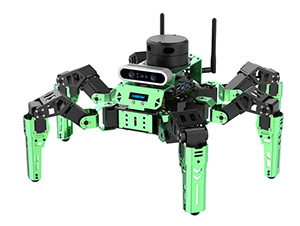Orbbec and Hiwonder Partner in Educational Robotics
- By Kate Lucariello
- 01/22/24

JetHexa hexapod robot (Photo courtesy of Orbbec)
3D vision technology company Orbbec and educational robot manufacturer Hiwonder have partnered to add Orbbec's 3D capabilities to Hiwonder's mobile robot platforms, the companies announced at this year's Consumer Electronics Show.
Under the partnership, Orbbec has newly entered the educational robotics industry, the company said. Hiwonder has over 50 technical patents, with STEAM education products in over 2,000 schools.
With the incorporation of Orbbec's 3D cameras into Hiwonder's robots, students can learn robot operations, sensors, vision, mapping, navigation, and human-machine interactions, Orbbec said.
Hiwonder's JetHexa ROS Hexapod Robot Kit and the JetAuto ROS Robot Car platform uses Orbbec's Astra+ 3D camera, NVIDIA Jetson Nano, and supports the open source Robot Operating System (ROS). It also uses OpenCV for image processing and includes MediaPipe development, YOLO model training, and TensorRT acceleration. Features of these products include:
- Orbbec's 3D camera with high resolution and low power depth vision for scanning, mapping, obstacle avoidance, navigation and more;
- A USB hub, multi-function expansion board and large capacity Li battery;
- Android and iOS apps and a wireless controller;
- Color recognition and tracking, vision line following, target object and tag tracking;
- Human body and fingertip trajectory recognition;
- Improved sound source localization with a 6-channel microphone array for voice interaction and voice command navigation; and
- Group control, formation adjustment, and synchronized performances.
"Our partnership with Hiwonder brings 3D vision and AI into the classroom with easy-to-use kits," said Amit Banerjee, Orbbec's head of platform and partnerships. "We have a shared goal to make the robotics technology accessible to educators, students and developers for hands-on learning experiences."
Visit Orbbec's technology page to learn more about how its camera systems work.
About the Author
Kate Lucariello is a former newspaper editor, EAST Lab high school teacher and college English teacher.